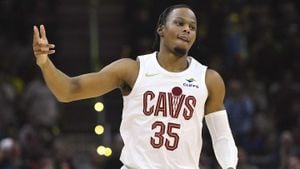Ukrainian President Volodymyr Zelenskyy has expressed his conditional willingness to resign if it would bring lasting peace to Ukraine, along with potential NATO membership. Speaking at a press conference on February 23, 2025, the eve of the third anniversary of Russia’s invasion, Zelenskyy confirmed his readiness to step down if necessary. His comments underline the desperate situation facing Ukraine amid intensified hostilities and geopolitical negotiations.
During this press conference, when ABC News Chief Foreign Correspondent Ian Pannell asked whether he would be prepared to resign for peace, Zelenskyy affirmed, "If for peace for Ukraine, it's truly necessary for you... I am ready." This statement was made against the backdrop of heightened tensions between Ukraine and the United States, especially following remarks from former President Donald Trump, who has accused Zelenskyy of acting as a dictator.
Besides his bold resignation offer, Zelenskyy proposed the possibility of exchanging his departure for NATO membership. He highlighted Ukraine's need for security guarantees to cement any peace deal, stating, "We can exchange it for NATO membership. If those are the terms, then let's do it without delay. I'm focused on Ukraine's security today, not in 20 years.” His commitment toward securing immediate support reflects the urgent need for safety amid relentless Russian aggression.
These assertions come on the heels of significant international dialogue—particularly between U.S. and Russian officials, who recently convened exploratory talks in Saudi Arabia without Ukraine’s participation. This exclusion has raised eyebrows and concerns among European allies about the ramifications of sidelining Ukraine. Meanwhile, the dynamics between Zelenskyy and Trump have reached new lows, aggravated by Trump’s insistence on imposing conditions on U.S. aid and allegations of dictatorship directed toward the Ukrainian leader.
On the funding front, Zelenskyy firmly rejected Trump's proposal demanding Ukraine repay $500 billion to the U.S. as compensation for previous military aid provided since the onset of the war, stating, "There cannot be (any) format which makes us debtors for the old (aid)." Zelenskyy asserted the need for reevaluation of the financial terms presented, explaining the support received should be recognized as grants rather than loans. This aspect of negotiation has proven contentious, as Zelenskyy seeks to maintain his country’s sovereignty and economic integrity during times of crisis.
Zelenskyy argues for the necessity of NATO membership for Ukraine, emphasizing its importance as the most cost-effective solution for the country’s security needs. This commitment was echoed during his press conference, where he articulated, "When it relates to security, it's about the reasonable guarantees for the future and how to achieve them together with our partners, especially with the U.S." His statements amplify Ukraine's push for consequences for Russia, which has persisted with military operations against Ukraine.
The recent military escalation witnessed overnight, with Russia launching 267 drones at Ukraine—the most numerous attack recorded during this conflict—added urgency to Zelenskyy's declarations. "Every day, our people are resisting aerial terror," Zelenskyy lamented. This predicament showcases the dire reality within Ukraine and the subsequent need for international solidarity and meaningful dialogues concerning peace and security strategies.
The current state of Ukrainian-American relations is fraught with tension, and Zelenskyy has articulated his hopes of mending ties with Trump, expressing his desire for the U.S. to play more than just the role of mediator. He stated, "I really want it to be more than just mediation... that's not enough.” This sentiment resonates with many Ukrainians who see Trump's administration's demands as potentially detrimental, moving away from the immediate security needs of recognition and support.
Many political leaders across Europe have underscored the importance of solidarity with Ukraine, voicing their commitment to putting pressure on the U.S. administration to stand united against Russia’s aggressive posturing. French President Emmanuel Macron and UK Opposition Leader Sir Keir Starmer have echoed sentiments calling for stronger European engagement without compromising Ukraine's sovereignty.
Regardless of the complex political situation, Zelenskyy remains resolute about his role as Ukraine’s leader and the importance of peace. “I am not going to be in power for decades, but we will not allow Putin to be in power over the territories of Ukraine either,” he affirmed. With approval ratings around 63%, he counters Trump’s critiques insisting on the necessity of accurate information disseminated about his leadership. Zelenskyy accused Trump of falling for disinformation propagated by Russian narratives, cautioning against the repercussions of such claims on public trust and international support.
Undoubtedly, Zelenskyy's challenging position combines both domestic interests and international diplomacy, with negotiations surrounding military aid, security agreements, and the push for NATO membership remaining central themes. His proactive approach shows not only determination to seek peace for Ukraine but also emphasizes the need for solidarity with allies to counter international aggression on Ukrainian soil.
While his future leadership remains under scrutiny, Zelenskyy's ambition to secure safety for Ukraine through conditional terms sets the stage for potentially transformative negotiations. The dialogue for lasting peace is thriving amid complex political maneuvering, awaiting the responses of global leaders and the outcomes of future discussions.
These developments reflect the constantly shifting dynamics as Ukraine continues to navigate its precarious stance between resilience against aggression and the urgent demand for international alliances to safeguard its sovereignty.
Indeed, as the future of Ukraine hangs delicately on diplomatic relations and security frameworks, the evolution of this situation warrants close attention from international observers invested in regional stability and the enduring fight for peace.
With this, Zelenskyy’s firm declaration adds another layer of complexity to the narrative surrounding Ukraine’s continuing battle for autonomy and safety on the European frontier. Timely responses from the West may shape both immediate outcomes and the long-term security architecture for the entire region.



